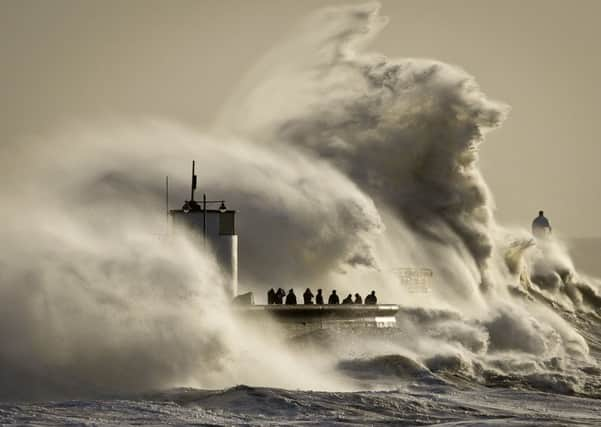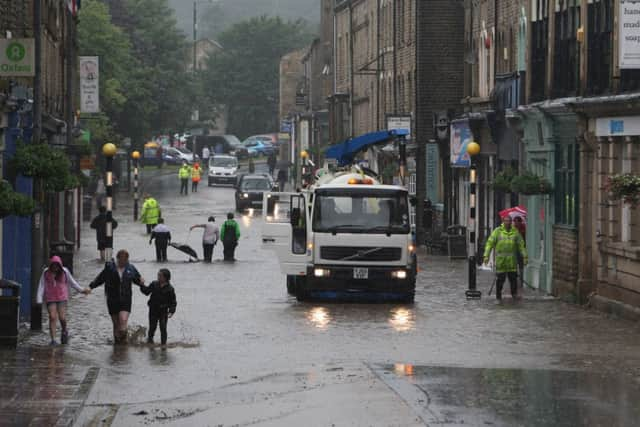Dancing around the issues of climate change as householders feel the chill


As deft sidesteps go, it wasn’t exactly in a league with Gene Kelly.
Less than 24 hours after David Cameron admitted the recent extreme weather, which has caused chaos around Britain, was likely to have been caused, at least in part, by climate change, his Environment Secretary was doing his best to avoid whipping up his own political storm.
Advertisement
Hide AdAdvertisement
Hide AdOwen Paterson, who has previously said he suspects the case for global warming has been overstated, was yesterday asked directly whether he shared his leader’s views. His response – to ignore the question completely – was textbook politician.


Not that it mattered. Cameron’s statement, which came as it emerged insurers are preparing to pay out hundreds of millions of pounds in compensation to flood victims, were already ringing around the chamber.
“He chose his words very carefully, but he had to didn’t he?,” says Professor Nigel Wright of Leeds University. “Owen Paterson has made various comments in the past which suggest he is sceptical about climate change and its certainly politically significant that David Cameron made the admission.”
Many now believe that we all need to get used to prolonged downpours and frequent storms as we pay for the sins of the 1990s when despite pledging to reduce carbon emissions they actually increased.
Advertisement
Hide AdAdvertisement
Hide AdCertainly there has been a large number of incidents in recent years. Hebden Bridge was hit by two major floods in a matter of weeks during the summer of 2012. That September, York was mopping up after one of the worst spells of flooding in its history and just last month a tidal surge on the East Coast saw 200 properties flooded in Whitby and Spurn Point closed off. Likewise Leeds was within centimetres of a major flood in 2000 and came close to flooding four times between 2004 and 2008.
“There is certainly a time lag between carbon emissions in the past and their environmental impact,” says Professor Wright, part of the Water@Leeds group set up by the university to provide a co-ordinated response to a number of issues, including global warming. “Even if we stopped emissions dead in the water today, we wouldn’t bring an end to climate change overnight.
“However, we do need to be honest about how we are doing in terms of meeting our long term targets in reducing carbon emissions. At the moment, the truth is we are not doing very well at all.”
The UK failed to cut carbon dioxide emissions by 20 per cent from 1990 levels by 2010 – a target set by Labour before coming to power in 1997 – and many experts are now waiting to see what the full impact of more recent spending cuts will be.
Advertisement
Hide AdAdvertisement
Hide AdClimate change has become a political football. Labour claim that despite appearing to be sympathetic to victims of flooding, the Government has been all talk and no action. It’s an accusation rejected by Ministers who insist the amount of money spent on flood defences has actually increased.
“Defra’s budget has been cut by 15 per cent, but when the Government says that actually the annual budget for flood defences has gone up, they are right,” says Professor Wright. “The problem is that while there may be more cash in the coffers to fund the projects there may not be enough staff to either make sure they are done well or that they are properly maintained over the next 10 or 15 years.
“You can’t just build flood defences and forget about them, they need constant investment.”
When gale force winds and heavy rain ravaged the country just before Christmas the potential impact of sustained extreme weather was laid bare. More than 150,000 properties were left without power, while others were evacuated as torrential downpours left hundreds of properties underwater.
Advertisement
Hide AdAdvertisement
Hide AdPower companies have faced criticism over their slow response to the situation and there has been a promise of a 999-style number for future emergencies. However, according to Prof Wright, just like the approach to the flood defences themselves, there is a more fundamental problem.
“There were a couple of factors involved last month,” he says. “It perhaps happened at the very worst time of year. I know if I was an engineer and got a call to ask if I would work on Christmas Day I would want to be paid a pretty generous package and those discussions have to happen before an emergency.
“However, the real worry is that there is no slack in the system. It’s not just energy firms, it’s the same with many of the country’s infrastructure companies. They can operate just fine when all is going well, but as soon as there is a problem there is simply not enough manpower to cope.
“It was the same when we had that prolonged spell of really cold weather a few years ago. Germany measure the amount of gas it has in reserve in terms of weeks. In this country we measure it in days.
Advertisement
Hide AdAdvertisement
Hide Ad“If we are going to deal with the realities of climate change then we need to be prepared and at the moment we are not.”
It’s a view echoed by leading insurer Henderson Insurance Brokers Leeds which says that many businesses in West Yorkshire have found themselves left high and dry following the recent bad weather.
“We estimate that businesses which prepare for flooding can save up to 90 per cent of the cost of lost stock and equipment as well was making it easier to obtain insurance in the first place,” says Peter Wilkinson, group claims director. “It’s about checking the Environment Agency’s flood maps, it’s about carrying out detailed risk assessment and looking at the value of things like flood barriers.”
Prof Wright, who purposefully bought his house on the top of a hill in Harrogate, would also like to see greater public awareness about the risk of flooding.
Advertisement
Hide AdAdvertisement
Hide Ad“Flooding is a part of life. Even with all the best planning in the world it is going to happen and there’s no point pretending otherwise. Part of the problem, I think, has been the tendency to describe the worst floods in recent history as a once in a 100-year disaster. That tends to make people think that once the clean up has happened they are fine for the next 99 years. What it actually means is every year there is a one per cent chance of flooding.
“It’s also worth remembering that when the Environment Agency looks at the merits of any flood defence scheme, it will only go ahead if it can proof that for every £1 invested it will save £8 in likely clean-up and repair costs. An early scheme planned for Leeds was shelved because the figure was only £3 or £4, but that’s still a pretty high ratio.”
He and many others would also like to see new housing developments built without using materials like plasterboard and chipboard. The first disintegrates in water and the second swells to such a degree that even once a property has dried out, the only option is to rip it up and start again.
While climate change sceptics are unlikely to be silenced by David Cameron and dismiss all reports which describe global warming as a man-made problem as inaccurate or misleading, according to Prof Wilkinson the evidence is now overwhelming.
Advertisement
Hide AdAdvertisement
Hide Ad“I’m a scientist, I deal in facts and I just don’t see how you can ignore the realities of climate change. Every day there is a minor disaster somewhere. Eight houses flooding in Leeds isn’t necessarily big news, but it happens and it’s all part of a much wider problem.
“We are certainly seeing more extreme weather patterns. The actual annual rainfall levels may remain broadly the same, but we get more intense storms and more extended periods of very dry weather. Because those rainfall patterns have become more erratic in recent years making accurate predictions based on historical records is very difficult. We can only deal in probabilities. However, it’s a bit like cigarettes. Smoking may not kill you, but on the balance of probabilities, it’s still best to give up.”
The science of climate change
Climate refers to the average weather experienced in a region over long period, typically 30 years.
Greenhouse gases, such as carbon dioxide and methane, which are naturally found in the atmosphere, trap heat from the sun. Without them, the Earth’s temperature would be about -18C.
Advertisement
Hide AdAdvertisement
Hide AdHowever, since the industrial revolution, human activity, mostly the burning of fossil fuels, has resulted in the release of large amounts of both CO2 and methane, which has enhanced the greenhouse effect and pushed up global temperatures.
Temperatures have risen by 1C and even if we could stop emitting all greenhouse gases now, they would rise by at least a further 0.6C.